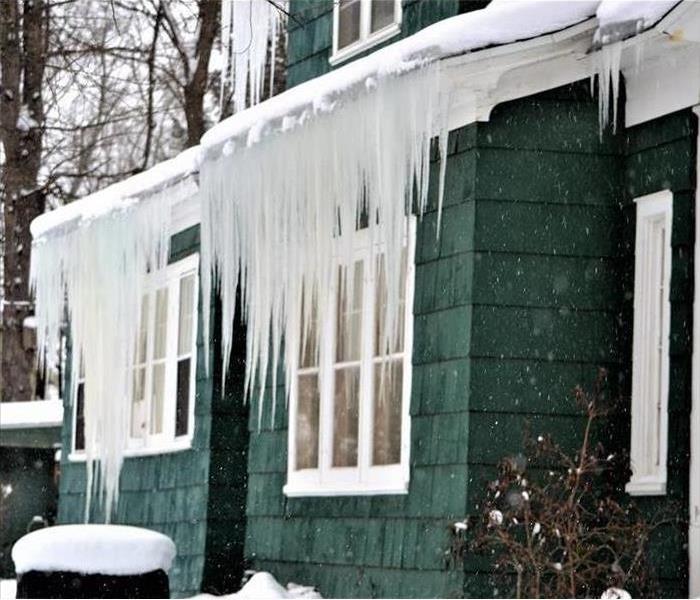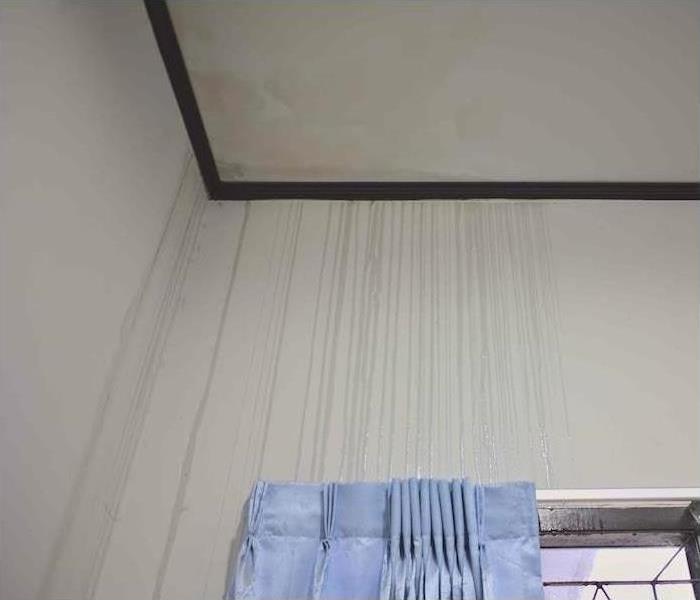Winter Water Damage
1/8/2025 (Permalink)
 Freezing temperatures, snow, and ice, your home or business could be in jeopardy of water damage.
Freezing temperatures, snow, and ice, your home or business could be in jeopardy of water damage.
Our winters are known to be brutally cold and large amounts of snow are always expected. With below freezing temperatures, snow, and ice, your home or business could be in jeopardy of water damage. It is crucial that you are aware of the hazards and can prepare, prevent or act quickly if faced with winter water damage.
FROZEN PIPES
A frozen pipe can burst at the point where the ice blockage inside the pipe is located, but typically the rupture is caused by the backflow pressure between the water source and the blockage. A burst pipe can cause considerable damage to your property if not addressed quickly.
ICE DAMS
Ice dams can be a major problem during the winter season. They form when heated air melts roof snow downward into water dammed behind still-frozen ice. When the trapped water cannot safely flow or run into the gutter system, it can backflow under the roof ’s shingles and into the structure’s interior areas.
Cold weather, snow, and ice storms can cause severe damage to your home or business. When these types of disasters strike, immediate action is necessary to prevent additional damage to your property. Our team has winter storm experience, expertise, and the resources to remediate damage caused by winter weather. If disaster strikes your home or business during the winter months, know that SERVPRO® has your back.
Preventing Water Damage in Your Home Starts Here
5/3/2024 (Permalink)
 It’s important to educate yourself about home systems that are designed to prevent water from entering your home.
It’s important to educate yourself about home systems that are designed to prevent water from entering your home.
The perks of owning your own home are great but it also brings a lot of responsibility. Homes are built in a way to provide maximum protection from water intrusion but sometimes those methods fail.
It’s important to educate yourself about home systems that are designed to prevent water from entering your home. Here are some of the most common points of failure in a home that could allow water to go where it shouldn’t:
- Faucets and Sinks. Faucets and sinks are places to check for leaks. Over time, the rubber gaskets in faucets can degrade which can lead to leaks. Sink drains are usually sturdy unless you have a clog and use too much plunger pressure to remove it. Too much pressure from plunging can damage seals, so always use caution.
- Disposals. Garbage disposals are one of the hardest working appliances, and they can spring a link. If you believe you have a leak, check out these tips for finding it.
- Gutters and Downspouts. Gutters and downspouts should be clean and free flowing. They should be inspected regularly and cleared of obstructions and debris. Downspouts should move water at least 30 inches away from the home, and the soil should also flow away from the home.
- Roof Damage. Falling limbs from trees are a real risk to roof systems. They can perforate the roof and damage or clog gutters. Shingles are especially susceptible to falling tree damage. Newer shingles are designed and constructed to be impact-resistant, hopefully reducing the need for expensive roof repairs. But shingles degrade over time, and a falling tree or limb can easily damage an aged shingle.
- Sewer Line Obstruction. This is a serious issue and usually takes a professional plumber to resolve it. Sewer lines can clog for a number of reasons, but two of the most common are root intrusion and grease buildup.
- Sump Pump Defect. A sump pump is designed to move water from a basement or crawlspace to outside the home into a drainage system. When a sump pump fails, water backups can affect your home quickly.






 24/7 Emergency Service
24/7 Emergency Service

